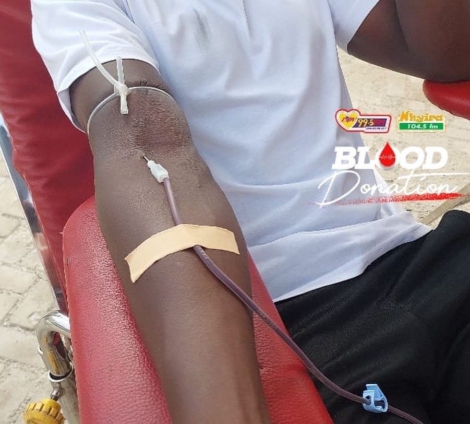A Medical Laboratory Scientist in Charge of the Blood Bank at the International Maritime Hospital (IMaH) in Tema, has urged Ghanaians to be honest when answering questions before they donate blood.
Ms. Doris Kusima Baiden explained that potential donors of blood were expected to answer a confidential questionnaire about their medical history before blood donation.
This is to give the health attendant a good idea of your general health and blood condition and foster a better service for donors and recipients.
Ms. Baiden was addressing issues related to blood donation at the weekly “Your Health! Our Collective Responsibility!" initiative by the Ghana News Agency aimed at promoting health-related communication and providing a platform for health information dissemination to influence personal health choices through improved health literacy
Ms. Baiden, supported by Mr. Robert Tetteh Djimajor, also a IMaH Medical Laboratory Scientist, explained that, as a routine before blood donation “we first take personal details like your name, age, date of birth, address, and other contacts. We then further proceed to ask confidential health questions.”
Ms. Baiden emphasised that donors were expected to come clean about medications taken in recent times, current health status, specific sexual activities, and other lifestyles.
“These questions are very confidential and help safeguard your own health and the health of the person receiving the blood. We only want to ensure that one is fully fit physically, mentally, and emotionally before donating blood,” she said.
She said that it is very important to be truthful because infections like HIV, Hepatitis B and C, and Syphilis could be transmitted by transfusion to a patient receiving blood.
She revealed that donating blood did not only benefit the receiver, but it also gave donors the chance to be offered a brief medical examination that included checking the temperature and pulse, blood pressure, ensuring minimum weight, and haemoglobin level.
“As a blood bank, it is our responsibility to ensure that all the blood coming in is safe for use and does not contribute to the loss of lives in the hospital. Saving lives is a collective responsibility, and all must endeavour to rightly go through the safe and secured procedures to donate blood,” she said.
Latest Stories
-
Trump picks Pam Bondi as attorney general after Matt Gaetz withdraws
23 seconds -
Providing quality seeds to farmers is first step towards achieving food security in Ghana
6 mins -
Give direct access to Global Health Fund – Civil Society calls allocations
3 hours -
Prince Harry jokes in tattoo sketch for Invictus
4 hours -
Akufo-Addo commissions 200MW plant to boost economic growth
4 hours -
Smallholder farmers to make use of Ghana Commodity Exchange
4 hours -
I want to focus more on my education – Chidimma Adetshina quits pageantry
4 hours -
Priest replaced after Sabrina Carpenter shoots music video in his church
4 hours -
Duct-taped banana artwork sells for $6.2m in NYC
5 hours -
Arrest warrants issued for Netanyahu, Gallant and Hamas commander over alleged war crimes
5 hours -
Actors Jonathan Majors and Meagan Good are engaged
5 hours -
Expired rice saga: A ‘best before date’ can be extended – Food and Agriculture Engineer
5 hours -
Why I rejected Range Rover gift from a man – Tiwa Savage
5 hours -
KNUST Engineering College honours Telecel Ghana CEO at Alumni Excellence Awards
5 hours -
Postecoglou backs Bentancur appeal after ‘mistake’
6 hours

